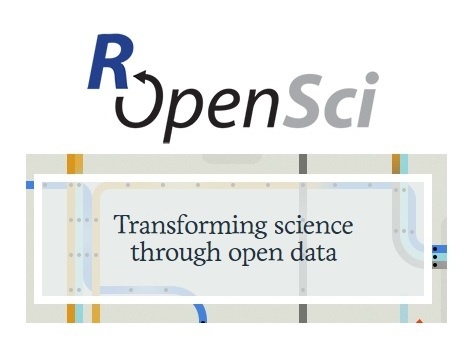rOpenSci : Transforming science through Open Data
09/03/2017


rOpenSci tools allow access to data repositories through the R statistical programming environment. rOpenSci packages facilitate drawing data into an environment where it can readily be manipulated, but also one in which those analyses and methods can be easily shared, replicated, and extended by other researchers.
____________________________________________________________________________________________________
|
Open Science "is the practice of making various elements of scientific research -- data & methods, code & software, and results & publications -- readily accessible to anyone. While this has great potential for advancing research (in addition to education, public policy, & commercial innovation) as a whole, there are both technical and social challenges preventing this practice from being more widespread … Why R for Open Science? R is an open-source statistical environment that can be used for not only statistics, but also for data acquisition, data manipulation, modeling, among other uses. R is increasingly being used by scientists across all disciplines and has overtaken popular scientific programming tools … The R framework is ideal for open science because:
|
rOpenSci's goal is to provide open-source tools to help facilitate the access and utilization of research data as well as explosion of mechanisms for data sharing. Yet these tools are not widely leveraged in scientific communities.
Part of the reason behind R's explosive growth is the ease with which the ever-growing userbase can add new functionality, a fact evidenced by 3,000+ currently available rOpenSci_Packages.
|
Packages are grouped by ones that acquire data, full-text of journal articles, altmetrics, data publication, focus on scalable and reproducibile computing, data visualization, data tools, image processing, taxonomy, HTTP tools, data analysis or geospatial work... Many of available rOpenSci packages are community-contributed. If you are interested in contributing a package, please visit rOpenSci_onboarding repository for details. |
Use rOpenSci packages to acquire data (both your own and from various data sources), analyze it, add in your narrative, and generate a final publication in any one of widely used formats such as Word, PDF, or LaTeX. Combine rOpenSci tools with the rich ecosystem of existing R packages.
In particular, with rOpenSci packages you will be able to:
- Access a vast trove of scientific data: rOpenSci packages provide access to more than 400 million museum records, data from more than 200 journals, 100k full text articles and so much more;
- Analyze your data with interactive plots, easily generate dynamics maps for any type of geospatial data;
Dive into detailed rOpenSci tutorials and tech notes for rOpenSci packages, look through various use-cases, or submit some of your own.
# rOpenSci is entirely a community driven effort and welcomes you to join it and help improve tools and practices available to researchers.
# OpenSci Discuss : a place for asking questions, reporting bugs, connecting with others in the community, discussing use cases, and more.
____________________________________________________________________________________________________
Learn more about rOpenSci HERE.
____________________________________________________________________________________________________
Related content:
- 2016 Open Source Yearbook
- INRA2025 : Open Science priority, Data sharing and much more
- Open Science 101 project
